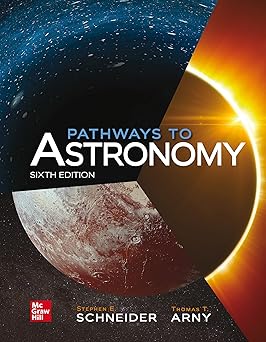Key Highlights
- •Comprehensive guide to fundamental astronomy concepts.
- •Updated 3rd Edition content for modern understanding.
- •Structured learning path suitable for students and self-learners.
Description
Ready to explore the wonders of the universe? Dive into (PDF) Pathways to Astronomy 3rd Edition by Stephen Schneider! This book is your friendly guide to the vastness of space, making complex topics accessible and exciting. If you're looking for a solid introduction to astronomy basics, this is a fantastic place to start.
Who is this book for? It’s perfect for college students taking introductory astronomy courses, aspiring amateur astronomers, science enthusiasts, or really anyone who looks up at the night sky and wonders 'what's out there?'. Even if you think space science is too hard, this book break it down for you. It's a great ressource for self-study too!
What problem does this book solve? Feeling lost in the cosmos? Overwhelmed by jargon and complex theories? Pathways to Astronomy aims to fix that. It provides a clear, structured path (see, it's in the name!) to understanding the universe, from our solar system neighbours to distant galaxies. It helps you build a foundational knowledge without feeling intimidated.
What will you gain from reading it? By reading this book, you'll get a comprehensive overview of modern astronomy. You'll learn about planets, stars, black holes, galaxies, the Big Bang, and how we know what we know. You'll understnad the methods astronomers use and appreciate the scale and beauty of the cosmos. This 3rd edition likely includes updated information on recent discoveries, keeping you current.
Why is it worth reading? Authored by Stephen Schneider, a respected astronomer, the book offers reliable information presented clearly. Its structured approach make learning logical and engaging. Think of it as your personal tour guide to the universe, helping you connect the dots between different astronomical concepts. It's widely used in classrooms, which speaks to its quality and clarity. Don't miss out on this chance to broaden your horizons! Download the PDF now and start your journey through the pathways to astronomy!
FAQ
Is this book suitable for absolute beginners with no science background?
Yes! While it's comprehensive enough for college courses, the book is written to be accessible and explains concepts clearly, making it a good starting point even if you're new to astronomy.
Can I use this book for self-study, or is it mainly a course textbook?
Absolutely! Its structured approach and clear explanations make it excellent for self-learners wanting a solid foundation in astronomy, not just for students in a formal course.
What kind of topics are covered? Does the 3rd edition include recent discoveries?
It covers a broad range of topics like the solar system, stars (their birth, life, and death), galaxies, cosmology (like the Big Bang), and methods used in astronomy. Being the 3rd edition, it's expected to incorporate more recent findings than previous editions.
Does the PDF include helpful visuals like diagrams and photos?
Astronomy textbooks like this typically rely heavily on visuals (diagrams, charts, photographs) to explain concepts. While we can't guarantee the specific PDF quality, the book itself is designed with illustrative aids.
The original title mentions '3th Edition'. Is that a typo?
Yes, '3th' appears to be a typo in the source title provided. This content refers to the '3rd Edition' of the book, which is the standard way to denote the third revision.
How is *Pathways to Astronomy* different from other intro astronomy books?
Readers often praise its clear narrative structure and how it builds understanding step-by-step. While covering similar topics to other intro books, its specific approach and explanations might resonate better with some learners. Plus, it's authored by an active researcher in the field.
Reader Reviews
About the Author
Stephen Schneider is a distinguished Professor of Astronomy at the University of Massachusetts Amherst. His research focuses on extragalactic astronomy, particularly the study of low surface brightness galaxies and neutral hydrogen in the universe. His academic expertise ensures *Pathways to Astronomy* is grounded in accurate, current scientific understanding.
